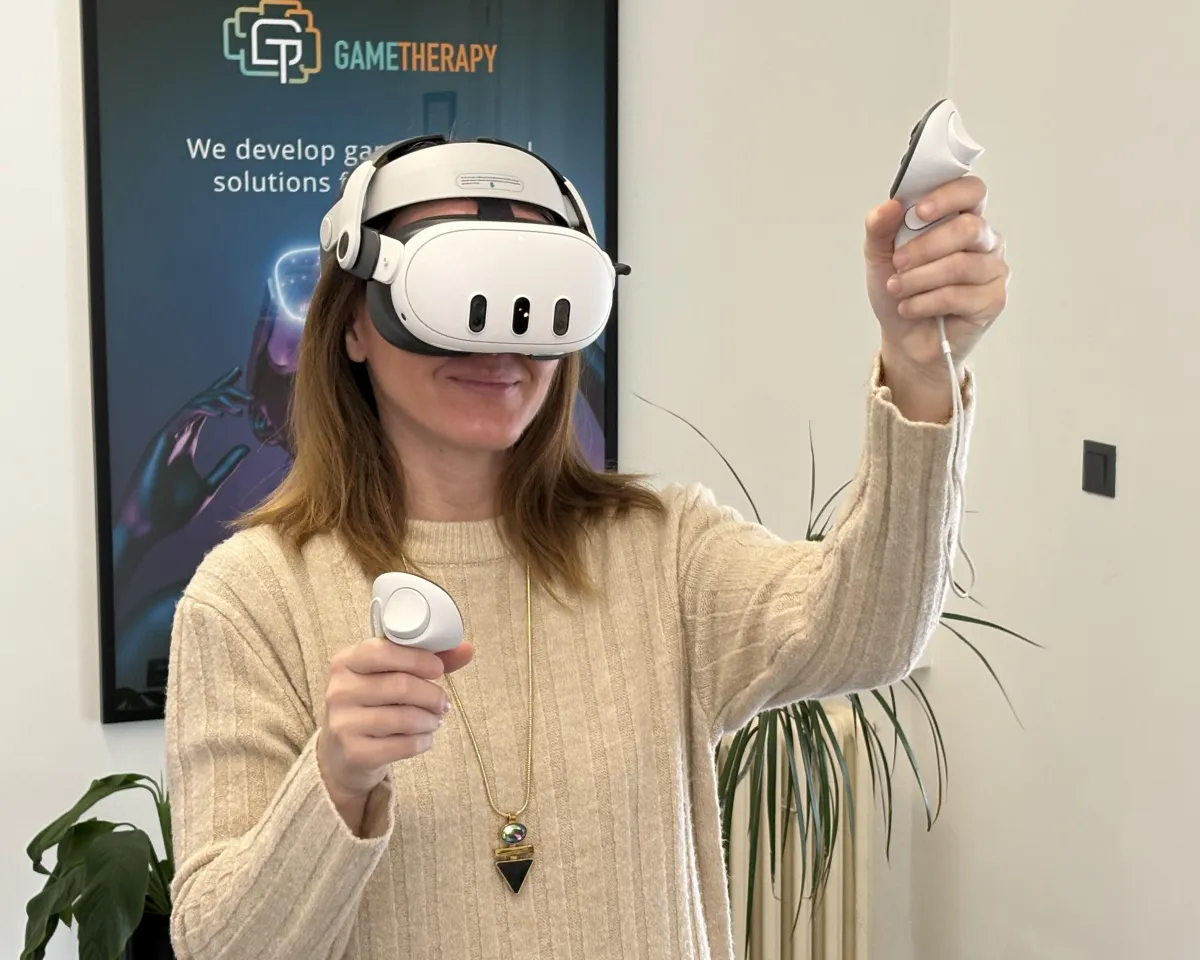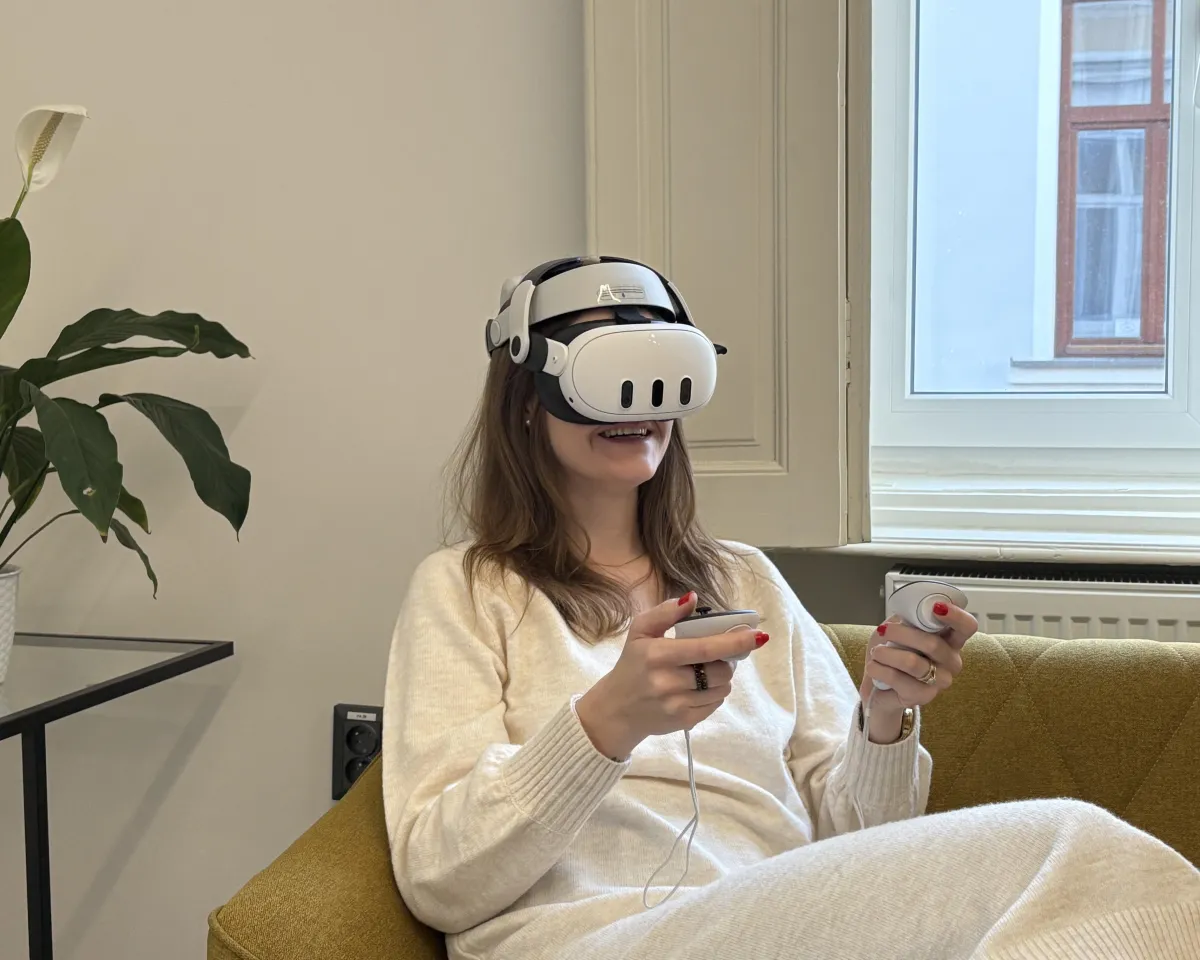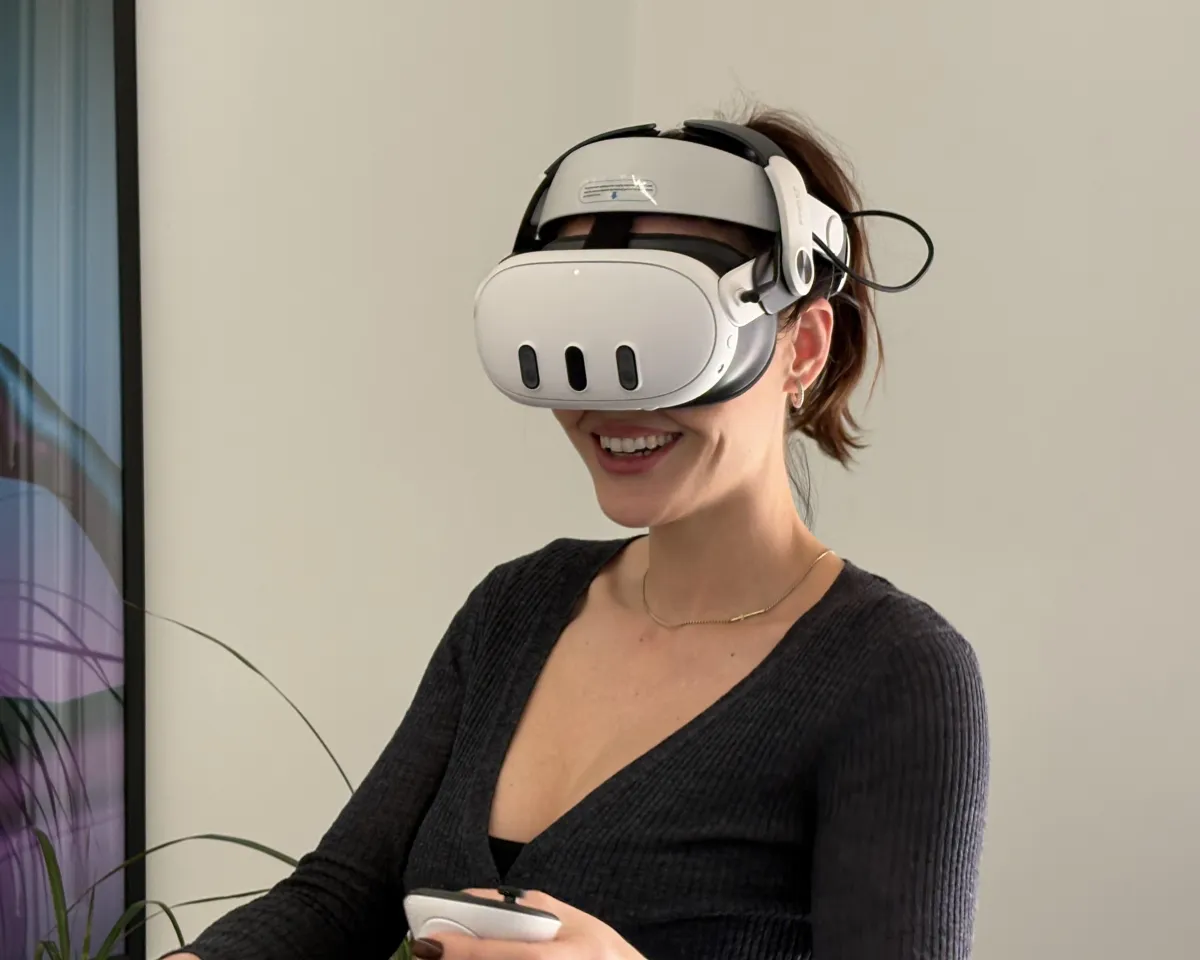BRIDGING RESEARCH, TECHNOLOGY, AND THE GAMING WORLD
Your partner in cutting-edge software development
Our mission is to transform human well-being and human-computer interaction. We do this by integrating virtual reality, augmented reality, and artificial intelligence technologies. At the heart of our philosophy is game-therapy. We create innovative, scientifically grounded, yet playful solutions for a wide range of challenges.

IMPACTFUL TOOLS FOR A BETTER QUALITY OF LIFE
Our products
ClaustrOFF
A game created with cutting-edge research to help you overcome fears in a safe, engaging, and effective way
NeuroBoostVR
Innovative exercises for seniors and others to improve motor skills, balance, and orientation with simple, effective activities
VIRADIA
Virtual Reality Platform for Early Diagnosis of Neurodegenerative Diseases, Revolutionizing Neurological Diagnostics
Experience the full power of VR for positive well-being
With a commitment to innovation and the transformative power of VR, we aim to make a lasting impact on mental health, education, industry, and personal growth, all grounded in scientific research and designed to enhance well-being worldwide.

GROWTH THROUGH INNOVATIONS
The GAMETHERAPY model
We harness the power of new technologies. By making care and training more accessible and tailored, we empower individuals and organizations to thrive. Rooted in scientific research, our innovative approach drives meaningful change, transforming mental health, education, healthcare, industry, and personal growth on a global scale.
SOLUTIONS THAT MAKE AN IMPACT
Immersive solutions for mental health and beyond
Our primary focus is on creating immersive applications that empower individuals to overcome challenges like anxiety, phobias, and neurological conditions. These solutions are designed to enhance well-being and unlock potential across various aspects of life, showcasing our expertise in innovative and impactful technologies.
Engaging VR/AR solutions for soft skills training
Evaluation in neurology and rehabilitation
General education
Personal development
Industrial training
Industry 5.0 applications

Join the Mind Heaven Community!
Be part of our journey to transform mental health care and well-being through innovation and gamification. By signing up, you’ll gain access to exclusive psychological content, enjoy discounts on our products, and stay updated with the latest news about our projects. You’ll also discover unique content like game stories and behind-the-scenes insights into our app development process. We value your ideas and feedback to make our games even better. Join us, become a co-creator, and help shape the future of the Mind Heaven Community!

Can Medication Help with Claustrophobia? Pros and Cons
Can Medication Help with Claustrophobia? Pros and Cons

"Medication can be a helpful tool in managing the symptoms of claustrophobia, but it works best when paired with other therapeutic approaches." – Dr. Martin Polák
Claustrophobia, the fear of confined spaces, can significantly impact daily life. For some, stepping into an elevator or sitting in a crowded room triggers overwhelming anxiety. While therapy and coping strategies are the primary treatments, medication is sometimes considered to help alleviate symptoms. But is medication the right choice for managing claustrophobia? Let’s explore the pros and cons to help you make an informed decision.
Understanding Claustrophobia and Its Symptoms
Claustrophobia is an anxiety disorder characterized by intense fear and avoidance of confined spaces. Common symptoms include:
Rapid heartbeat or chest tightness
Shortness of breath or hyperventilation
Sweating or trembling
Feeling of panic or an urgent need to escape
These symptoms can disrupt daily routines, making medication a potential option for temporary relief.
How Medication Can Help with Claustrophobia
Medications don’t cure claustrophobia, but they can help manage its symptoms, particularly in acute situations or as part of a broader treatment plan. Here’s how they work:
1. Reducing Anxiety Symptoms
Certain medications target the physical and emotional symptoms of anxiety, providing temporary relief.
2. Enhancing Therapy
Medication can make it easier to engage in therapies like Cognitive Behavioral Therapy (CBT) or exposure therapy by reducing anxiety levels.
3. Emergency Situations
In high-pressure scenarios—like flying on a plane or undergoing an MRI scan—medication can provide short-term relief to help you get through the experience.
Types of Medication for Claustrophobia
Several classes of medications are commonly prescribed to help manage claustrophobia:
1. Anti-Anxiety Medications (Benzodiazepines)
These fast-acting medications, such as lorazepam (Ativan) and alprazolam (Xanax), are often used for short-term relief.
Pros: Rapid effect, helpful in acute situations.
Cons: Risk of dependency with long-term use; potential for drowsiness and impaired coordination.
2. Antidepressants
Selective serotonin reuptake inhibitors (SSRIs), like sertraline (Zoloft) and escitalopram (Lexapro), are commonly used for anxiety disorders.
Pros: Effective for long-term management of anxiety.
Cons: Takes several weeks to work; potential side effects include nausea, headaches, and insomnia.
3. Beta-Blockers
Medications like propranolol are sometimes used to manage the physical symptoms of anxiety, such as rapid heartbeat or shaking.
Pros: Reduces physical symptoms; effective for situational anxiety.
Cons: Not helpful for emotional symptoms of fear.
4. Sedatives
These medications are typically reserved for specific medical procedures, like MRIs, where immediate anxiety relief is required.
Pros: Provides temporary relaxation.
Cons: Not suitable for regular use.
Pros of Using Medication for Claustrophobia
Medication can be a valuable tool in managing claustrophobia when used appropriately:
Rapid Relief: Medications like benzodiazepines work quickly to calm the mind and body.
Supports Therapy: Reduced anxiety can make it easier to engage in therapy.
Emergency Use: Ideal for one-off situations, like traveling or medical exams.
Cons of Using Medication for Claustrophobia
Despite its benefits, medication comes with certain drawbacks:
Temporary Solution: Medication addresses symptoms but doesn’t resolve the root cause of claustrophobia.
Side Effects: Common side effects include drowsiness, nausea, and dependency risks.
Cost: Long-term use can be expensive, especially without insurance coverage.
Alternatives to Medication
While medication can provide relief, non-pharmaceutical options are equally important for long-term management:
1. Cognitive Behavioral Therapy (CBT)
CBT helps identify and challenge irrational thoughts that fuel claustrophobia.
2. Exposure Therapy
Gradually confronting feared situations helps desensitize the mind and body to triggers.
3. Breathing and Relaxation Techniques
Controlled breathing and mindfulness exercises can help manage symptoms during anxiety-provoking situations.
4. Virtual Reality (VR) Therapy
VR therapy offers a safe environment to practice exposure to confined spaces, such as elevators or crowded rooms.
When Should You Consider Medication?
Medication may be a good choice if:
Therapy alone isn’t providing sufficient relief.
You face an unavoidable anxiety-provoking situation, like air travel.
Your symptoms severely impact your daily life.
It’s essential to consult a healthcare provider to weigh the benefits and risks of medication based on your unique needs.
Combining Medication with Therapy
Studies show that combining medication with therapy often yields the best results. Medication can help reduce immediate symptoms, while therapy addresses the underlying fear and teaches long-term coping strategies.
Scientific Evidence
A study in the Journal of Anxiety Disorders (2022) found that combining SSRIs with CBT reduced claustrophobia symptoms by 70%.
Research from Behavior Research and Therapy (2023) highlighted the effectiveness of benzodiazepines for acute symptom management during exposure therapy.
Final Thoughts
Medication can be a helpful tool in managing claustrophobia, especially for acute situations or when combined with therapy. However, it’s not a standalone solution. Long-term success often involves a combination of strategies, including therapy, exposure techniques, and self-care practices. Always consult a healthcare professional to determine the best approach for your needs.
References
Antony, M. M., & Swinson, R. P. (2023). Pharmacological approaches to treating anxiety disorders. Journal of Anxiety Disorders.
Hofmann, S. G., & Smits, J. A. J. (2022). The combination of medication and therapy for phobia management. Clinical Psychology Review.
Wiederhold, B. K., & Riva, G. (2023). Virtual reality therapy for anxiety and phobias. Cyberpsychology, Behavior, and Social Networking.






